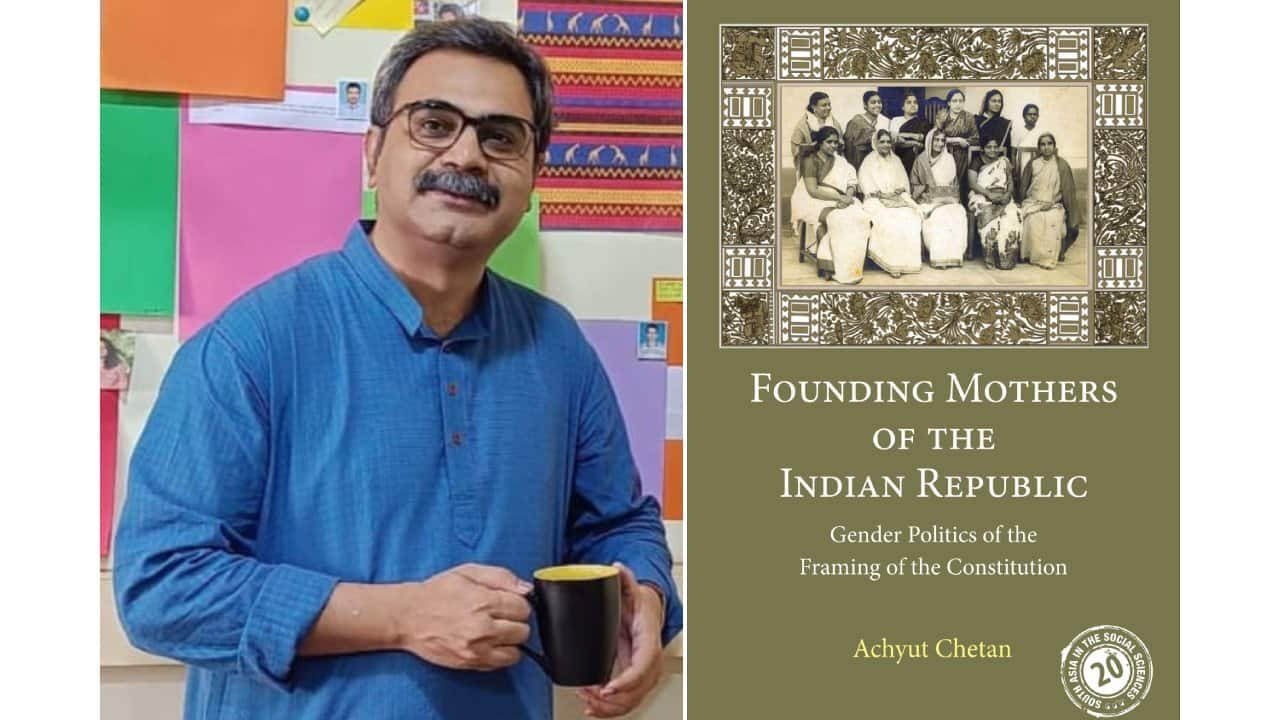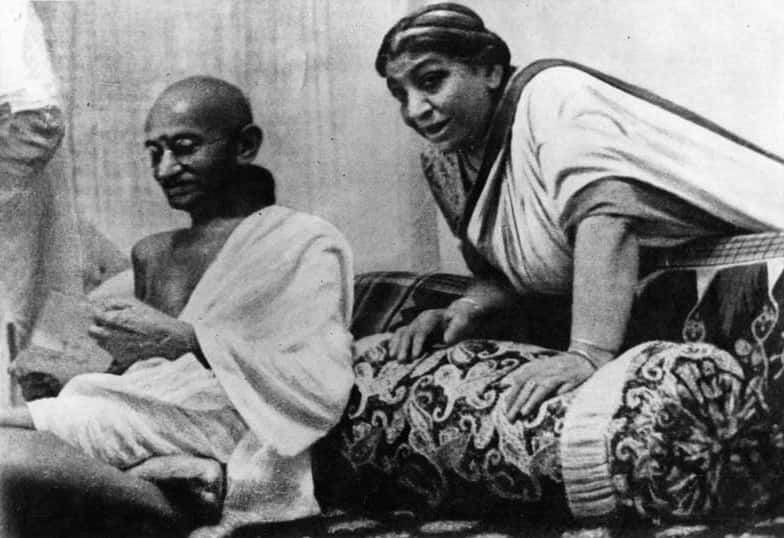



Achyut Chetan, associate professor of English and dean at the Faculty of Arts and Social Sciences, St Xavier’s University, Kolkata, talks about his book Founding Mothers of the Indian Republic: Gender Politics of the Framing of the Indian Constitution (Cambridge University Press, 2022) which was shortlisted for the New India Foundation’s Kamaladevi Chattopadhyay NIF Book Prize 2023 with a cash component of Rs 15 lakh rupee, which is given to the best non-fiction book on modern/contemporary India.
 Achyut Chetan, and the cover of Founding Mothers of the Indian Republic.How did it feel to be shortlisted for the Kamaladevi Chattopadhyay NIF Book Prize?
Achyut Chetan, and the cover of Founding Mothers of the Indian Republic.How did it feel to be shortlisted for the Kamaladevi Chattopadhyay NIF Book Prize?I wrote this book in Dumka, Jharkhand, which is a very secluded part of the country, so knowing that it is being read widely brings me a great sense of satisfaction. The women who contributed to the making of the Indian Constitution have been a forgotten part of the history of our republic, and my book is an invitation to ‘un-forget’ if I may use that word.
What makes this prize special is the fact that it is named after Kamaladevi Chattopadhyay, one of the foremost feminists of her time, who was not part of the Constituent Assembly but was indirectly involved in the making of the Constitution and is also a protagonist in my book.
How did your academic training in literature help you work on this book?Students of literature question how books are written. We try to understand a book by examining who has written it. Literary criticism has made us sensitive to the gender, caste, class and race of the author. I found myself perturbed by the repeated and uncritical use of the phrase “founding fathers” to talk about the authors of the Indian Constitution because 17 women were elected to the Constituent Assembly tasked with framing the Constitution of India – Begum Aizaz Rasul, Begum Jahanara Shahnawaz, Begum Shaista Suhrawardy Ikramullah, Ammu Swaminathan, Dakshayani Velayudhan, G. Durgabai, Sucheta Kripalani, Vijayalakshmi Pandit, Purnima Banerji, Kamala Chaudhri, Sarojini Naidu, Hansa Mehta, Rajkumari Amrit Kaur, Leela Roy, Malati Choudhury, Renuka Ray and Annie Mascarene.
I must confess that I had started my research with the flawed assumption that the Constitution of India is not a gender-sensitive document. I wanted to write a critique of it because academic circles – including feminists – had convinced me that the Constitution was written by male authors and therefore has a patriarchal bias and perpetrates violence against women.
One evening, my father – an old-school lawyer – asked me if I knew of the women members of the Constituent Assembly and their role in the framing of the Constitution. I had never read about these women, or even heard of them. I was alarmed by own ignorance. My research went through a paradigm shift when I began looking at data in the archives. My training of working with literary texts enabled me to read between the lines, and to appreciate the gender sensitivity of the language that was used by women members of the Constituent Assembly.
Instead of blaming politicians for the erasure of these women’s contributions from our history, you hold fellow scholars responsible. How did you come to hold this view?In the last few decades, there has been a huge scholarly investment in retrieving women’s voices. The publication of Volumes I and II of Susie Tharu and K. Lalita’s anthology Women Writing in India: 600 B.C. to the Present paved the way for a lot of feminist historiography. Therefore, it seems absurd that much academic writing on the Indian Constitution, including feminist scholarship, limits itself to the men who were part of the Constituent Assembly.
Another problem is that scholars tend to judge women of the 1940s and 1950s by today’s standards. They expect those feminists to hold the same positions as contemporary feminists. There is a perception that women in the Constituent Assembly may not have contributed a great deal; that the founding mothers were there mainly for tokenistic and decorative value.
Apart from scholars, I think that judges of the Supreme Court have also been responsible for erasing women’s contributions whenever they have used the expression “founding fathers”.
Did all the women in the Constituent Assembly identify themselves as feminists?All of them took positions that were seen as feminist at that time even if they did not have prior experience in the women’s movement. Seven of them had been office-bearers in the All-India Women’s Conference. The women’s movement was not monolithic, so they had disagreements on issues but also forged solidarities as women working in a patriarchal setup.
 Mahatma Gandhi and Sarojini Naidu at the 1942 AICC Session. (Image via Wikimedia Commons)How did these women contribute to discussions on the right to property?
Mahatma Gandhi and Sarojini Naidu at the 1942 AICC Session. (Image via Wikimedia Commons)How did these women contribute to discussions on the right to property?Most of them who came from the women’s movement were socialist in their ideological approach, and this was reflected in the positions they took. Renuka Ray and Pandit Jawaharlal Nehru stopped talking to each other for a while because of their heated arguments over the right to property, specifically the compensation that the state would have to pay when it expropriated private property for public use. Not all of them were socialists. G. Durgabai could be a called a centrist. Begum Aizaz Rasul was from a land-owning family.
The making of every article of the Constitution can be analysed through a gender lens. My book does not offer an exhaustive study of how the right to property was debated but I hope that other scholars will take off from what I have presented, and bring us further insights.
You point out that Dakshayani Velayudhan was the only Dalit woman in the Constituent Assembly, and she had differences with Dr. B.R. Ambedkar on some issues. Tell us more.Dakshayani Velayudhan was among the youngest members of the Constituent Assembly. She had differences with Dr. B.R. Ambedkar on the matter of separate electorates and on the question of the manner in which reservation or affirmative action would be implemented. She took positions similar to the other women who were involved in framing the Constitution.
Discover the latest Business News, Sensex, and Nifty updates. Obtain Personal Finance insights, tax queries, and expert opinions on Moneycontrol or download the Moneycontrol App to stay updated!
Find the best of Al News in one place, specially curated for you every weekend.
Stay on top of the latest tech trends and biggest startup news.